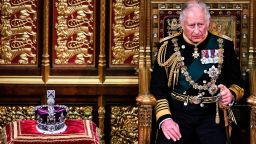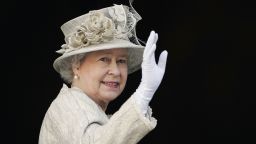Editor’s Note: Joseph Romm, a former Acting Assistant Secretary of Energy for Energy Efficiency and Renewable Energy during the Clinton administration, has written eight books on climate and clean technology, most recently, “Climate change: What everyone needs to know.” He holds a doctorate in physics from the Massachusetts Institute of Technology. The opinions in this commentary are his own. Read more opinion at CNN.
For more than five decades as Prince of Wales, Charles, heir to the British throne, spoke about the perils of climate change and the need for concerted global action to protect the environment.
In one of his first speeches on the environment in 1970, he warned presciently about the growing problem of air pollution “pumped out by endless cars and airplanes.” He once again showed himself to be ahead of the curve when he began calling for climate action in 1990.

But past is not necessarily prologue, especially now that the speaker of such bold statements is the new sovereign of the United Kingdom.
The question for the new King, his subjects and for environmentally-minded people all around the world is, what will Charles do now?
Will he abandon an environmental platform, one that has allowed him to bring greater awareness about climate change to millions of people? Will he remain silent and on the sidelines of the environmental movement, at the very moment when the pernicious effects of global warming are being felt more keenly than ever?
Some readers of political tea leaves have pointed to his first speech as King as evidence that Charles will choose to give up his public campaigning, even on matters as pressing as the impending global climate disaster.
In last week’s address to the British people, Charles pledged to uphold “constitutional principles.” He added that, “it will no longer be possible for me to give so much of my time and energies to the charities and issues for which I care so deeply.”
It echoes what he said in a BBC documentary a few years ago when, asked whether he would continue his public campaigning after becoming king, he responded that being a sovereign is “a separate exercise.” Once crowned King, Charles said, he could only act “within the constitutional parameters.”
Indeed, Britain’s uncodified constitution does say the sovereign should not offer opinions on political issues. And certainly his beloved late mother Queen Elizabeth who died last week upheld that tradition for her entire reign.
But there is a greater imperative even than Charles’ adherence to Britain’s unwritten constitution. And the newly-crowned King already knows what it is.
At the UN’s November 2021 COP26 climate conference in Glasgow, Scotland, Charles declared that climate change is an “existential threat” that must put us all on “a war-like footing” if we hope to defeat it. He warned that, “Time has quite literally run out for the nations of the world to begin “radically transforming” their economies away from fossil fuels to renewables.
Recent studies show the wisdom of those words, revealing that the earth is approaching multiple climate tipping points even sooner than we thought. The lamentable fact that the world’s leaders have failed to mount a sufficiently robust response to climate change was felt this summer in Britain itself, which just a few weeks ago saw record-smashing temperatures of 104°F.
But Charles has obligations that go far beyond the boundaries of Britain. The 56 nations comprising the Commonwealth have committed in their charter to helping each other achieve prosperity through sustainable development, “in particular by addressing the adaptation and mitigation challenges of climate change.”
The Commonwealth includes many of the world’s countries which are most vulnerable to climate change, including numerous low-lying island nations uniquely susceptible to sea level rise and worsening tropical storms, such as Tuvalu, Kiribati, Vanuatu, the Maldives and a dozen Caribbean countries. It includes 21 African nations which are also feeling the adverse effects of climate change. And it includes Pakistan, where warming-fueled deluges have put one-third of the country underwater. India too, a former British colony, has seen record flooding this year. Scientists also predict that sea level rise could displace 18 million Bangladeshis by 2050.
The prime minister of Australia – one of 14 Commonwealth countries that still recognize the British sovereign as head of state – also said it would be appropriate for Charles to keep advocating for the climate. “I think dealing with the challenge of climate change shouldn’t be seen as a political issue,” he said Prime Minister Anthony Albanese, adding that it’s about our “survival as a world.”
Even from the perspective of political self-interest, any monarch hoping to win the favor of subjects in those faraway former colonies – some of which have openly announced that they are reconsidering whether they plan to become republics in the wake of Queen Elizabeth II’s death – might consider making environmental advocacy part of his agenda.
But some activists in former British colonies say that the imperative on Charles to remain engaged on environmental matters is not just political, but moral.
Climate expert Basav Sen, who was born and raised in India, asserts that Britain was “literally the one political power that started the fossil-fueled Industrial Revolution,” and that “the colonial plunder” by the British Empire “provided much of the capital investment” for it. It is an argument that some in the UK might reject out of hand, but it remains the way many climate activists in Britain’s current and former overseas territories view the matter.
In a 2020 interview at the World Economic Forum, Charles wondered, “what good is all the extra wealth in the world … if you can do nothing with it except watch it burn in catastrophic conditions?” He asked, “Do we want to go down in history as the people who did nothing to bring the world back from the brink?” His answer to his own question: “I don’t want to.”
The following year, Charles launched the Terra Carta, a mandate and road map for climate action that gives “fundamental rights and value to Nature.” As he wrote in the foreword, it takes its name from the Magna Carta of 1215, which “inspired a belief in the fundamental rights and liberties of people” – an implicit case, if ever there was one, that climate action can be deemed a constitutional principle.
Surely, these are not the words of a man who now intends to go silent in the face of one of the most dire emergencies facing civilization.
And while tradition might suggest that he should remain mum on political matters, a new sovereign is well within his royal prerogative to shape the contours of his reign. At least, that’s what some political observers are saying. One, Charles’s former press secretary, Julian Payne, noted that, “The King is a convener” who could gather “the best brains and the most experienced people and listen to their ideas” on climate action.
The UK’s Conservative Party has supported climate science and action since Prime Minister Margaret Thatcher. By March 2022, half of conservative backbench Members of Parliament had joined the Conservative Environment Network, which embraces the country’s pledge of net zero emissions by 2050.
Where Charles might have his work cut out for him is in pressing Britain’s new Prime Minister Liz Truss on climate action in his private weekly meetings with her. Truss has promised that she would be “doubling down in our drive to hit net zero emissions by 2050 in a Conservative way which helps households and businesses.”
Sadly, she has appointed climate skeptics and deniers to senior positions, such as transportation secretary, energy secretary and trade secretary. Even if he eschews a role in the public eye speaking on climate, he must be an activist monarch in ensuring Conservatives stay on track with her government’s own climate benchmarks.
Charles can and should make climate change a key focus of his reign, both in public and private. Indeed, it’s probably the only way to keep the monarchy relevant in the coming decades where climate change becomes the world’s dominant issue as its impacts are increasingly widespread and catastrophic.
Get our free weekly newsletter
- Sign up for CNN Opinion’s newsletter.
- Join us on Twitter and Facebook
No one is suggesting that the King will rule as a carbon copy of his mother; it would be foolish for him to even try. But he must endeavor to win over the public on his own terms, in his own way and by pressing the issues and priorities that he cares about – climate action being chief among them.
To do less would be to tie his hand behind his back on the one issue which he appears to care about above all others and which would allow him to make a truly consequential mark as Britain’s new ruler.
"Opinion" - Google News
September 16, 2022 at 11:33PM
https://ift.tt/rl4IJFA
Opinion: The one political issue Charles should keep speaking out on - CNN
"Opinion" - Google News
https://ift.tt/Hf2mxeI
Shoes Man Tutorial
Pos News Update
Meme Update
Korean Entertainment News
Japan News Update




No comments:
Post a Comment